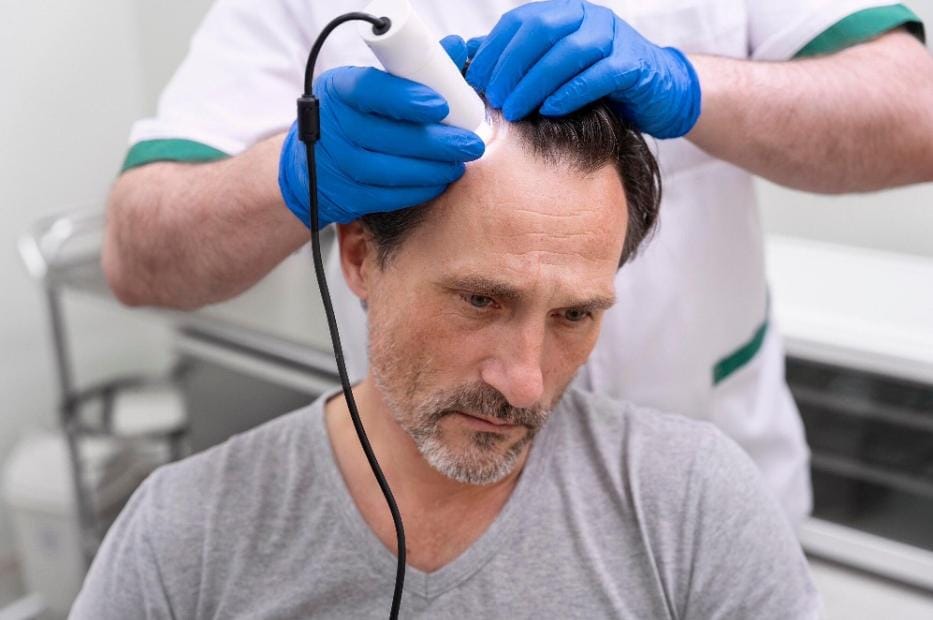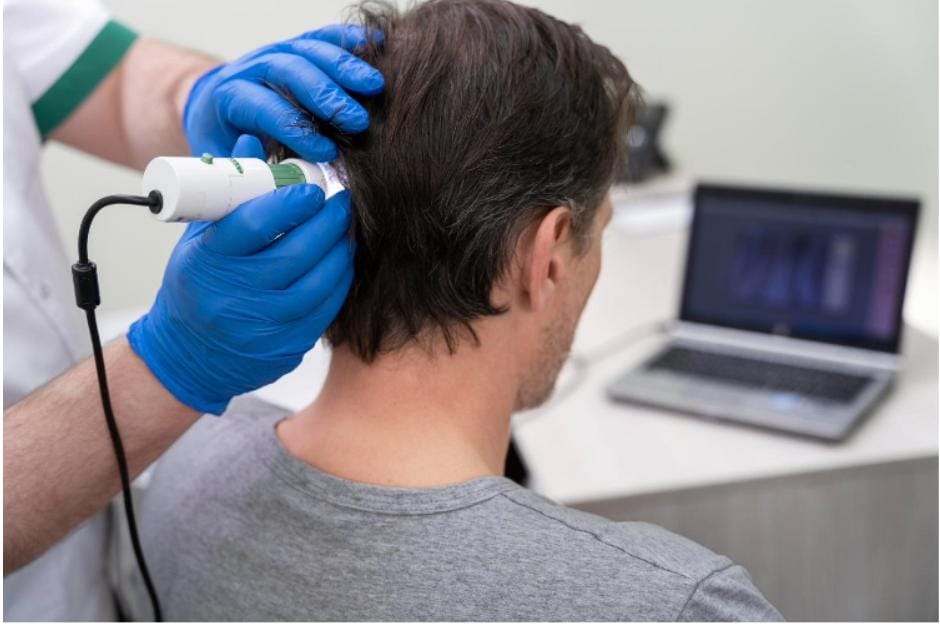Carreer in Trichology
Trichology is an emerging field in cosmetics. As the demand for trichology services is rising, more and more people want to pursue their careers in this field. As trichology is a relatively new field, there are no particular federal regulations about its certification. So, the certification process is a bit complicated. Don't worry; we will guide you about it as well.
Trichology covers various conditions related to hair and scalp, for example, hirsutism, male or female-pattern baldness, alopecia, seborrheic dermatitis, and many others. A trichologist is a professional who identifies and treats these conditions (Trüeb, 2018).
It is quite an interesting field because it not only treats medical conditions but also provides hair aesthetic services.
Let's see what the required qualifications and skills are to become a successful trichologist.

It is a common misconception that you need a medical degree in dermatology to become a trichologist. Well the truth is you can be a college student and still become a trichologist. Let's see how.
Trichology offers you 3 different routes:
⦁ Trichology hair stylist
⦁ Trichology technician
⦁ Clinical technologist
You can select one based on your interests and circumstances.
Many hair salons in the U.S. are hiring hair stylists who have a diploma in trichology. It improves the quality of hair care and also enhances the salon's reputation.
You don't have to get super fancy degrees to be a trichology-focused hairstylist. Just take a trichology course from a respected institute approved by a federal organization such as NCFE.
In a hairdresser salon, certain treatments might weaken hair or lead to dry scalp or hair loss. A knowledgeable trichologist understands these problems and addresses the client's needs accordingly.
A trichology-specialized hairdresser can:
⦁ Professionally assess clients' scalp and hair conditions.
⦁ Identify the root causes of hair issues.
⦁ Gain more expertise in selecting the right hair or scalp care products.
⦁ Perform advanced treatments like scalp mesotherapy, laser treatments, and cleansing peels.
Hair stylist trichologists have studied Trichology from a scientific perspective. They understand hair and scalp problems based on their education but can't diagnose or prescribe treatments.
While they can conduct research, exams, and tests, they shouldn't go beyond their expertise in diagnosing or prescribing therapies. They can also teach Trichology to others in their field.
Candidates should preferably have completed an "A" level or above in school and have a particular interest in fields relating to science and health.
To become a non-medical (hair stylist) trichologist, you can apply for a cosmetology program and finish the coursework, which usually takes 2–3 years to become certified.
While some trichologists focus solely on trichology, most also work as hairdressers or hair restoration specialists.

Many people suffering from different scalp and hair conditions approach hair restoration clinics. At these clinics, there are doctors and technicians who help people with hair restoration.
A Trichologist Technician is an important part of the hair restoration team. Here's a list of a few responsibilities and skills required by trichologist technicians:
⦁ Conduct tests, analyze hair samples, and assist in diagnostic procedures
⦁ Help during consultations by gathering relevant information, discussing
concerns with clients
⦁ Assist transplant surgeons during hair restoration procedures
⦁ Maintain detailed records of client histories, test results, and treatment plans
⦁ Operate specialized equipment for hair analysis, use computer programs for
data management
The trichology field is always changing, so Trichologist Technicians should attend different workshops and training sessions to keep up with the latest developments.
⦁ Get an undergraduate degree.
⦁ Search online or get in touch with your nearby community college to find a
hair restoration program.
⦁ Apply for an associate’s degree in hair restoration, medical transcribing, or
cosmetology.
Typically, these degrees take about 2 years to complete, and many programs offer online options as well.

If you're interested in the medical field and want to become highly skilled in your field, you can aspire to be a clinical trichologist.
This involves working in a hair clinic or hospital, where you assess patients and recommend treatments for their hair issues. A clinical trichologist is someone who is an expert in studying and understanding hair and scalp disorders. They assess and treat conditions such as hair loss, dandruff, and other issues related to the health of the hair and scalp
(Trüeb, 2018).
Clinical trichologists often work in collaboration with dermatologists and other healthcare professionals to provide comprehensive care for individuals experiencing hair and scalp problems.
⦁ Take the history of clients related to their disease.
⦁ Examine the client's hair and scalp.
⦁ Prescribe medications for hair and scalp problems.
⦁ Recommend and provide treatments available.
⦁ Operate in settings like hair restoration clinics or hospitals specializing in
dermatology.
⦁ Counsel the client about their condition and provide authentic information
about the treatment options.
⦁ Track the progress of treatments and adjust recommendations as needed.
⦁ Get an undergraduate degree.
⦁ Take the medical college admission test, also known as the MCAT exam.
⦁ Pass the test and go to a medical college.
⦁ Get a medical school degree.
⦁ Complete your residency in dermatology or plastic and reconstructive
surgery.
⦁ You can also get a University Master’s Degree in Trichology Science in
addition to a Bachelor’s degree and/or a specialized degree.
The post-graduate Medical Trichology diploma program is intended to provide students with a thorough grasp of the subject.
Essential subjects covered in the curriculum include trichoscopy, prevalent hair and scalp problems, physiology and anatomy of the hair and scalp, treatment methods, and new developments in trichology
(Trüeb, 2018).
Students improve their skills by gaining vital expertise in identifying and dealing with an array of hair and scalp issues via hands-on instruction and clinical rotations.
The duration varies with the pathway you choose.
It is a very simple course offered by different organizations accredited with the American Medical Certification Association (AMCA), International Association of Trichologists, Association of Registered Trichologists, or NCFE. The course can be online or in the form of physical classes, and its duration can be from 1 to 3 years
(Trichocare Education, 2022).
Do not fall for any organization offering a less than 6-month course.
It takes about 4 to 5 years to become a technician in trichology.
⦁ Two years for an undergraduate degree.
⦁ 2 to 3 years for an associate degree in trichology.
This is a very long route as compared to the above two and requires a lot of dedication. It takes 6 to 8 years to become a clinical trichologist.
⦁ Four years of medical school.
⦁ 2 to 4 years of residency in dermatology.
If you dream of being a hair restoration surgeon, it will take a bit more time – about 2 more years of medical school to get a special certification in dermatological surgery.
To choose a trichology program:
⦁ Opt for a clinical certification for a medical focus, which is thorough and
suitable for clinical work.
⦁ Consider an associate certification for styling or assisting, which is ideal for
salon or clinic roles and generally shorter. Associate programs take about 6
to 18 months to complete.
⦁ Choose an in-depth program with an academic component for a reputable
education, typically taking 6 months to 3 years.
⦁ Avoid quick certifications; opt for programs lasting at least 6 months for
thorough preparation.
⦁ Apply online, pay tuition (usually $500–3,000 per year), and start your online
studies, as most trichology certifications are earned online.
This is one of the most frequently asked questions related to trichology. The average annual income for a trichologist is
$54,787, with an hourly rate of approximately
$26.34.
Different factors like experience, clinic location, and qualifications can influence these earnings. It's crucial to weigh these aspects in your career decision-making process.
Trichology is a diverse field; it is not only limited to diagnosing and treating hair conditions but also provides aesthetic services by non-medical trichologists. To become a pro in your field, you need not only a degree but also some practical experience.
As a doctor should not pretend to be a hair stylist, similarly a hairdresser should also not go on diagnosing or prescribing medicine for clients.
Although hair stylist trichologists also have medical knowledge about different conditions of hair and scalp, they're not qualified to provide medicinal services. Similarly, a lab technician should not be doing a trichology surgeon's job in the operator room.
Choose your path in trichology and start working on it now. "Enjoy your journey as much as the destination."
Trüeb, R. M., Vañó-Galván, S., Kopera, D., Jolliffe, V. M. L., Ioannides, D., Gavazzoni Dias, M. F. R., Macpherson, M., Ruíz Ávila, J., Gadzhigoroeva, A., Ovcharenko, J., Lee, W. S., Murugusundaram, S., Kurata, S., Chang, M., & Tanglertsampan, C. (2018). Trichologist, Dermatotrichologist, or Trichiatrist? A Global Perspective on a Strictly Medical Discipline. Skin appendage disorders, 4(4), 202–207.
https://doi.org/10.1159/000488544 




